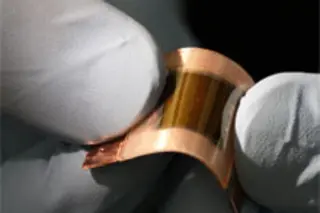In a quest to build a better solar cell, North Carolina State University chemical engineer Orlin Velev is borrowing from nature’s experts in collecting the sun’s energy: leaves. Starting with the natural pigments that help plants harvest solar rays, Velev and his team have crafted a flexible, nontoxic photovoltaic device that he hopes could eventually generate clean electricity far more cheaply than today’s silicon-based solar panels.
Velev’s one-square-inch prototypes consist of light-sensitive molecules—including the photosynthesis powerhouse chlorophyll—embedded in a water-based gel sandwiched between copper and plastic electrodes. Unlike traditional solar cells, many of which contain toxic elements such as cadmium, the biologically derived materials in Velev’s device can be safely released into the environment after use. The cell’s flexibility could make it an ideal choice for covering irregular surfaces; large pieces could even be rolled up or folded for easy transportation.
“This is a totally different way of thinking compared ...















